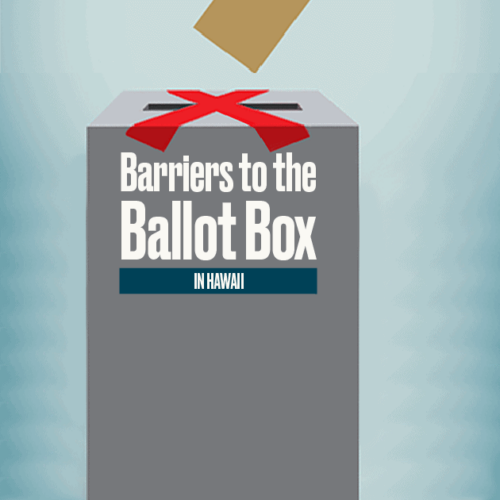Introduction
Hawaii has long been plagued by an abysmal voter turnout rate.
In 2018, less than 40% of the state’s voting-eligible population turned up for the general election — the lowest rate in the nation, according to a U.S. Elections Project analysis.
Sign up for The Moment newsletter
Our CEO Susan Smith Richardson guides you through conversations and context on race and inequality.
But a glimmer of hope emerged this year: Despite the challenges posed by the coronavirus pandemic, more than 51% of registered voters cast their ballots in the state’s August primary. By contrast, only 38.6% voted in the 2018 primary.
The jump in voter turnout appears due in large part to reform efforts by the legislature, which established online registration starting in 2016 and approved this year’s switch to a vote-by-mail system.
About 99% of some 406,000 people who voted in this year’s primary did so using a mail-in ballot, according to the Honolulu Star-Advertiser.
But voting rights groups are concerned that, while an improvement from the old system, mail-in voting could work against some marginalized populations — particularly those with housing and language-access issues.
Here’s a look at some of the barriers to voting rights and access that remain in the Aloha State:
Mail-in ballots
State election officials began mailing ballots to registered voters earlier this month, intended to arrive in voters’ mailboxes about 18 days prior to the Nov. 3 election.
For this year’s primary, a similar mailing effort struggled to reach voters without stable housing — particularly those among some 6,400 people who are homeless. In a state with one of the the nation’s highest per-capita rates of homelessness — second only to New York, according to a January annual survey — advocates are bracing for a repeat of that problem.
“This is what I say about Hawaii’s vote-by-mail system: It is really good for the ‘landed gentry’ — if you have a stable home, it’s really good for you because a ballot will get to you. But if you don’t have a stable environment, you have to chase that ballot down,” said Sandy Ma, executive director of Common Cause Hawaii. “We want the vote-by-mail system to work for everyone equally because that’s how democracy should work, and we see room for improvement.”
Advocates also say mail-in voting is a challenge for voters with limited English proficiency. Under the Voting Rights Act, voters on Oahu — home to the state capital, Honolulu — will be notified of language translation services available in Ilocano and Mandarin. But such services are not available for voters on other islands.
Voter service centers
The deadline to register for mail-in voting was Oct. 5 in Hawaii — 29 days before Election Day. That’s among the earliest cutoff dates in the country.
Voters can still walk in and register before and on Election Day, so long as they have a proper ID or proof of residency. But they must do so at “voter service centers” — and getting to one could prove challenging for some voters.
That’s because only eight voter service centers will be open throughout the state. On Oahu, only two are available, despite having more than a half million registered voters. The Big Island also has only two, even though its land mass is twice the size of Delaware.
Advocates are worried that the paucity of voter service centers could force late-deciding voters to wait in long lines and risk COVID-19 infection on Election Day.
Felony disenfranchisement
Hawaii is among 48 states in which people convicted of felonies are stripped of their voting rights while incarcerated. The voting rights are automatically restored upon their release, but advocates are calling for the state to join the District of Columbia, Maine and Vermont in never taking away the privilege in the first place.
According to the American Civil Liberties Union of Hawaii, the state’s felony disenfranchisement law now bars about 6,000 Hawaii residents from voting — including about 2,340 Native Hawaiians.
Native Hawaiians are disproportionately bearing the brunt of the law’s impact because they make up nearly 40% of people with felony convictions in the state, even though they represent only about 20% of the total population.
The ACLU of Hawaii says disenfranchising people with a felony conviction is ultimately “detrimental to public safety.”
“Ensuring everyone has the right to vote without regard to whether they are in prison or not recognizes both the fundamental role that voting plays in perfecting our democracy as well as the racist nature of our criminal legal system — which in Hawaii disproportionately impacts and disenfranchises Native Hawaiians,” said Mandy Fernandes, policy director of the ACLU of Hawaii. “Voting is a way for people to contribute to and feel invested in their communities. We know that civic participation helps people successfully reenter their communities, which is key to improving public safety. We should encourage that type of civic participation, particularly for people who are trying to rehabilitate themselves.”
Read more in Money and Democracy
US Polling Places
Clerical woes could present problems for rural Alaska voters
Witness signatures won’t be required on mail-in ballots for the 2020 general election.
US Polling Places
In Vermont, hope that universal mail-in balloting becomes the norm
Advocates see opportunity for one of the country’s most progressive voting rights states to do even more.


Join the conversation
Show Comments